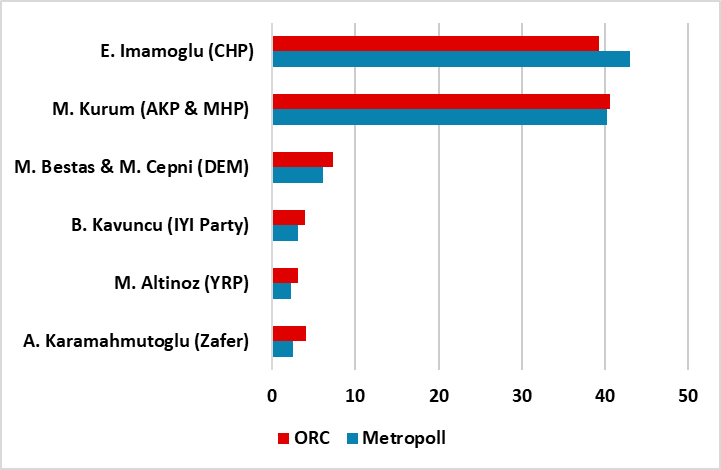Turkiye: AKP Wants to Win Major Cities Back on March 31
Bottom line: Unless something unforeseen occurs, we think Justice and Development Party (AKP) will likely remain the highest rated party in the Turkish local elections on March 31, winning more local municipalities than any other parties in Turkiye. Despite AKP’s main target is to win back the major cities such as Istanbul, Ankara and Izmir, the recent polls foresee that Ankara and Izmir will likely remain administered by a Republican People’s Party (CHP) mayor, while election outcome for Istanbul remains too close to predict. It appears the votes to New Welfare Party (YRP), Good Party (IYI Party) and Peoples’ Equality and Democracy Party (DEM) will be the key determinants since the growing support to YRP will likely dent support to AKP, and DEM and IYI Party would eradicate support to CHP, particularly in the metropolitan cities. We see some no major political volatility during and/or after the elections.
Figure 1: Vote Intentions Polls for Istanbul (%)

Sources: Metropoll and ORC
Despite AKP will likely remain the highest rated party in the Turkish local elections on March 31, AKP’s main goal is to win back the major cities such as Istanbul, Ankara and Izmir. The recent polls show that Ankara and Izmir will likely remain administered by a CHP mayor in the next five years, while election outcome for Istanbul is currently hard to envisage.
The latest opinion polls in Ankara show that CHP’s candidate Mansur Yavas, who is the current Ankara mayor, leads the polls with a difference of 7-8 points. Analysts think that Yavas continues to take votes from the IYI Party and the Nationalist Movement Party (MHP) alignments, while AKP’s Ankara candidate Altinok mostly receives support from the AKP’s grassroots, leading to a difference which cannot be easily closed in less than a month.
Polls suggest that CHP’s candidate in Izmir, Cemil Tugay, is ahead of AKP’s candidate Hamza Dag by around 10 points. There are comments that there are negative reactions to CHP's Izmir candidate and the nomination of strong candidates by DEM and IYI Party in Izmir may indirectly benefit AKP, but we foresee these won’t be enough for AKP’s Dag to win and Tugay will be new Izmir mayor after Tunc Soyer.
The situation in Istanbul is very complicated. Major polls show that there will be a knife-edge election competition between Murat Kurum and Ekrem Imamoglu in Istanbul.
According to the Metropoll’s survey on February 22-23 (Figure 1), Istanbul metropolitan municipality mayor Ekrem Imamoglu will receive 43.5% of the votes, while People's Alliance candidate Murat Kurum's vote will be 40.2%, after the undecided votes are dispersed. (Note: AKP and MHP’s candidate Murat Kurum was the former Minister of Environment and Urbanization).
According to the election survey conducted by ORC on February 10-12 (Figure 1), Murat Kurum is expected to receive 40.6% of the votes. Imamoglu follows right behind his opponent with 39.3%. DEM’s candidates will rank the third with 7.3%, the Victory Party (Zafer) and the IYI Party will take the 4 and 5 places, with a vote rate of 4% and 3.9%, respectively.
On the basis of the results of the polls, we foresee Istanbul race will be very close. We think that the floating votes will be decisive in the election outcome. Additionally, the votes received by the candidates of DEM, IYI Party, YRP and Zafer Party can also play a major role in the final outcome.
The political analysts foresee that the race will be fierce in some other metropolitan cities, as well. For instance, in Hatay and Antalya, it appears that CHP is currently behind the AKP. In Hatay, which was heavily damaged by the February 6 twin earthquakes, analysts think that people are reactive to CHP's candidate Lutfu Savas, who is the current mayor of the city. The polls demonstrate that CHP candidates are in the lead in Aydin, Adana and Mersin while it appears the competition will be knife-edge in Bursa. Konya, Trabzon, and Sanliurfa will likely remain governed by AKP mayors.
We think the votes to New Welfare Party, IYI Party and Peoples’ Equality and Democracy Party will be the key determinants since the growing support to YRP will likely dent support to AKP, and IYI Party and DEM would eradicate support to CHP, particularly in the metropolitan cities. We see no major political volatility during and/or after the elections. Whoever wins, the budget would remain under pressure due to Q1 pre-election spending, which would squeeze the beleaguered economy further.